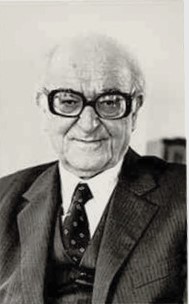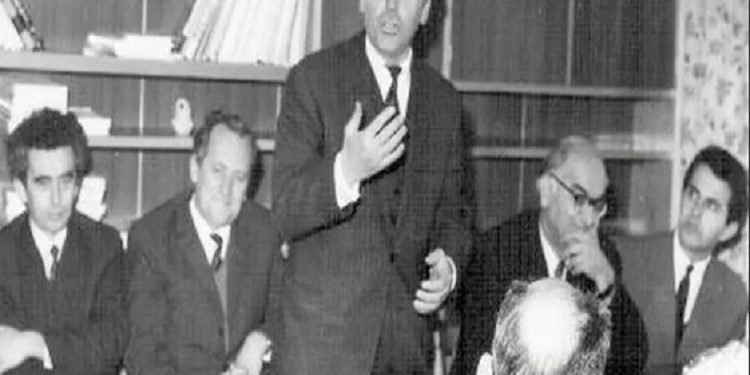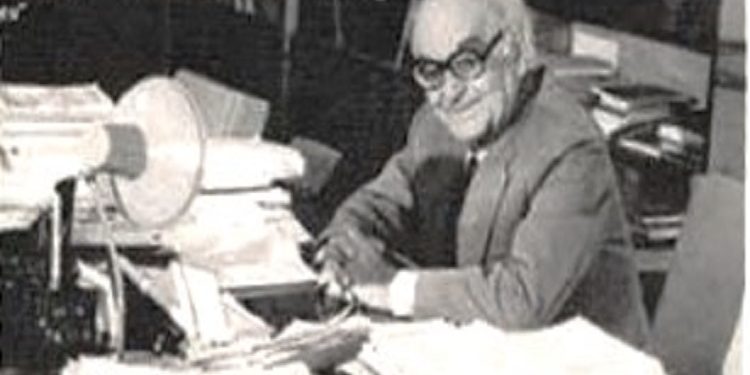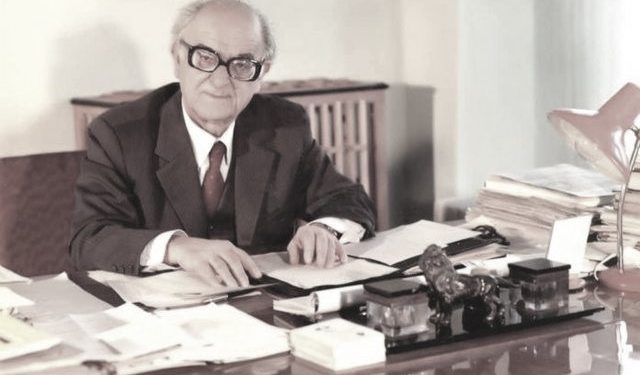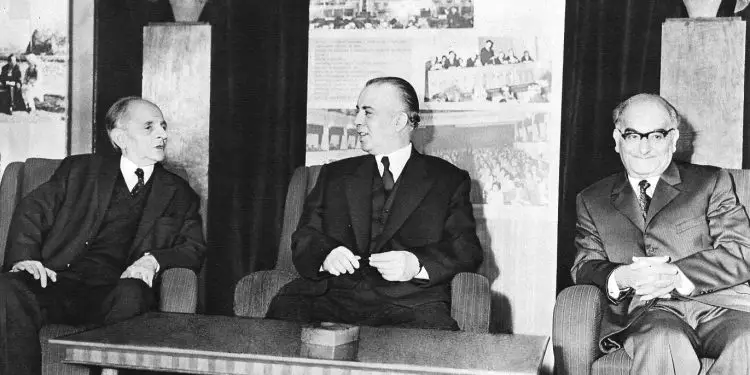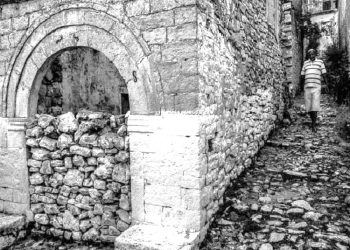By Dr. Andi Pinari
The first part
-Aleks Buda, a European scholar, in Albanian totalitarianism-
METHODOLOGY
Memorie.al / This short presentation will try to reflect the scientific and administrative activity, as well as the circumstances in which the personality of the professor arose and acted, will focus on issues related to the relationship of this researcher, as part of the intellectual elite in the years 1945-1954, with the Albanian totalitarian model. These years can be considered as the harshest years of Albanian totalitarianism, because they are the first years of the installation of a new political and state model, which had the class struggle as its principle and state violence as its tool. His academic activity of these years can help to understand to what extent the orientation of scientific research, came from the tradition of the National Renaissance and the period between the two wars, was imposed from above, or depended on the researcher.
Involvement in the administrative career, holding state posts, was another feature that points to the dual position as a scholar and state official, in several important positions. The main sources that have been used are documents of the AQSH, as well as original documents, such as letters or notes, which have been very kindly made available to us by Mrs. Tatjana Haxhimihali, the daughter of prof. Buddha. The books ‘Memories’ and ‘Memories 2’, which provide valuable information about his life and career, were very valuable for this work.
Also of great interest is the summary of the statements of the conference Alex Buda, “A life for Albanianology”, organized by the Academy of Sciences, on the occasion of the 100th anniversary of the professor’s birth, held in 2010 and published in in 2012. In this conference, historical researchers and his collaborators, who had personal acquaintance with him, participated and expressed their opinions.
In the documents of the former State Security, made available by the Authority for Information with the Documents of the former State Security, no personal files were found in his name, although he is mentioned in the files of his colleagues who were under surveillance. However, this paper cannot be exhaustive, especially regarding the data from the unknown archival materials of the former State Security, a wide field of research, which requires time and perhaps in the coming years, there will be even more information from these unknown documents.
Academic and political training
Aleks Buda was born in a middle-class family, educated and equipped with a high-level intellectual education, considering the level of Albanian society at the time. His father, Dhimitër (Taq) Buda, had graduated in Greece, as a pharmacist, at the insistence of his father, who was a doctor graduated in Italy.
After completing his studies in Thessaloniki, Taq Buda set up a pharmacy in the center of the city, which he managed professionally. As evidenced by an article from 1913, by an Austrian journalist named Kraus, quoted in ‘Memories’, during his visit to the city, he noticed a pharmacy equipped in a modern way, with drugs coming from Thessaloniki and Trieste.
Taq Buda was quite active in the public life of the country, still under the Ottoman occupation, helping the National Renaissance towards the finalization of Albania’s independence. He was a participant in the Congress of Bitola and helped in the development of education in the Albanian language, as a contributor with money, in the “Normal” of Elbasan. He was also one of the active participants in the national movement, as a political activist and one of the signatories of the document declaring independence in the city of Elbasan, on November 25, the city that first declared independence.
This shows, among other things, the great weight that the elite of the city of Elbasan held in the political life of the country, the elite which was quite engaged and possessed all the skills for dignified representation at the national level. Afterwards, he was a deputy in two legislatures of the Albanian parliament, in the years 1921-1924.
Born in 1910, Aleks Buda was greatly influenced in his patriotic formation either by his family or by the atmosphere of the 20s-30s, where patriotism prevailed dictated by the specific conditions of the new state, when the country needed he had to raise and strengthen his institutions. Taq Buda sends his children to school, following his father’s example and believing that the best investment for them was education alone.
Aleksi attends school in his hometown for a few years, then leaves to continue his studies in Italy and then in Graz, Austria. After finishing the gymnasium in Salzburg, where he also learns Latin and ancient Greek, an important part of the school curriculum in the classical gymnasium, with 8 hours a week, Aleksi enrolls in the University of Vienna, initially in the branch of pharmacy, having the influence of to the father. After only one semester, he changed his major, enrolling in the Faculty of Philosophy, to continue his studies in the history and literature department.
This direction that he took with full will was the result of his passion for social sciences, a passion that was further enhanced by the high level of his professors, where prominent Albanianologists are distinguished; Karl Patsch and Norbert Jokl, with whom he also created social relations, due to their deep knowledge of Albania. During the years of his studies in Vienna, he was associated with other Albanian students, such as Skënder Luarasi, Krist Maloki, Eqrem Çabej, Lasgush Poradeci, etc.
In those years, the political consciousness also begins to form, being a contemporary of a rather turbulent period for European history, such as the world economic crisis, the Bolshevik revolution or the rise of fascism and Nazism. As stated in his memoirs, he lived in Austria for 18 years, which he considers to be the most decisive years of life, where a person is formed intellectually and develops culturally and begins to mature as a personality. In the 1930s and 1940s, Vienna was also an important center of many Albanian patriots and intellectuals, mainly of the anti-Zogist diaspora, where the most important were Fan Noli, Sejfi Vllamasi, Azis Çami, Ali Këlcyra, etc.
Meanwhile, official Tirana carefully supervised all Albanian students abroad, especially those from Vienna, in order to control the anti-Zogist diaspora of this city. As prof. Buda in his memoirs, the Albanian consul received information about the local Albanians, among other things, about Aleksi, who together with his brother, Mihal, were considered suspicious, because they were associated with the well-known professor Skënder Luarasi. In the documents of the Ministry of Education, there is detailed information on Albanian students, whether they are scholarship holders of the Albanian state or Albanian students who cover their own expenses.
A form filled out by the Ministry’s employees and signed by the student’s parent certified the student’s status for the Albanian authorities. There are also the names of the Buda brothers, the city where they studied, the relevant branch and the progress of their studies. The close friendship with Skender Luarasi, whom he proudly calls “my teacher”, seems to have been one of the decisive moments for his formation. Luarasi’s influence was so strong in the circle of Albanian students that in a letter written and signed by them, about 15 students addressed the Ministry of Education in 1930.
They ask the authorities to return the scholarship to Skënder Luarasi. This scholarship was discontinued in 1929, after Luarasi was unjustly accused by the consul Çatin Saraçi, as being involved in political activity, against his country. This fact is rejected by the signatories of the letter, who say that this serious charge does not stand, because his character never allowed him to work against his homeland. The letter was signed by Mihal and Aleks Buda, as well as other students, including Eqrem Çabej.
The spirit of solidarity created among the Albanian students of Vienna was characteristic of those youth years. In this line and with significant consequences, was the 1938 visit to Vienna of Ali Kelmendi, who was one of the first Albanian communist activists, who took refuge in Alex’s room for several weeks. This episode caused the Vienna police to search his room.
These elements from the life of prof. Budës, show a political tendency towards the left in the years of studies, having as a model the European social democracy, although there was sympathy for Marxism, due to the extreme polarization dictated by the time. Luarasi himself had joined the international volunteers in the Spanish Civil War since 1936.
Buda graduated in 1938 and began to deal with linguistics, with the help of the prominent albanologist Norbert Jokl, at that time a professor at the University of Vienna. With the occupation of Austria by the Nazis, Jokli began to suffer persecution and Buda, now a graduate, returned to Albania in 1938. Upon arriving in his homeland, he was questioned by the police about his connections with those who spread Bolshevik ideas and with Ali Kelmendi, and the Albanian authorities imprison him in Elbasan for 20 days.
Alex Buda, as an active participant in the resistance against the invader
The fascist occupation of April 7, 1939 found him in Elbasan, where he participated in the spontaneous demonstration against the occupation that took place in the city. In September 1939, he began working as a professor of literature at the Tirana Gymnasium, where he was surrounded by an intellectual environment and a very heated atmosphere, due to the occupation. In addition to teaching, he was also involved in many activities with a political background, as an expression of the spontaneous resistance of Albanian intellectuals to the Italian occupation.
As a professor of literature, he directed and staged the play “Vilhem Tel”, where the main actors were his students. This part was perceived by them as a model of resistance to the occupation where, among other things, during the performance, even though it was not part of the drama at all, the patriotic song was sung; “For the Motherland”. The show was suspended and prof. Buda was called to the Ministry of Education to give explanations.
In 1940, he was transferred to the Korça High School, although the authorities did not leave him alone and after checking the house where he was staying in Korça, they escorted him to Tirana, towards the prison. There he was interrogated, regarding the reasons for his stance against the occupation and his participation in the demonstration of November 28, 1939. After a few days, he was released from prison without any charges and returned to Korça. In the summer of 1940, he was forcibly recruited into the Italian army and sent to Italy, along with many other teachers.
This was one of the ways of fascism, to convince and subjugate the Albanian intelligentsia. He manages to escape from military service, providing a medical report and in August 1941, he returns to the Korça High School, where he stays for only 6 months, after he managed to register at the University of Padova. There he attends qualification courses in linguistics and works with the Italian linguist, Taliavini, studying general Balkan linguistics.
In the summer of 1942, he finally returned to Albania, because the situation in his family no longer allowed him to travel to Padua. His brother, Sofokl Buda, was involved in the National Liberation Movement, being one of the most active members of the guerrilla unit of Elbasan. For this reason, his mother is arrested, which he manages to release after a while.
He resumes work at the Gymnasium of Tirana and eventually connects with the Movement, being involved in the illegal National Liberation Council of Tirana. Meetings of this council are organized in his house. From the fall of 1943, he goes to Elbasan, because he was assigned to participate in the National Liberation Council of the city of Elbasan.
Although he was engaged in the National Liberation Movement, which would give him the opportunity to engage in state positions later, he was an intellectual who had created a reputation among Albanian researchers. Among other things, this cooperation can also be seen in the relationship with Arshi Pipa, with whom they were colleagues for a while at the Tirana High School and who were connected by their passion for knowledge and books.
In a letter that Pipa sends to Buda, in March 1944, he asks him to express his thoughts regarding the publication of Pipa’s book ‘Nailors’, as well as the first issue of the magazine ‘Kritika’, which the latter had begun to publish. Pipa tells him, among other things: “It is too much to add that your cooperation will be a great help and that I expect from you, more than from others”.
Another letter of interest from this period is the letter sent to Father Zef Pllumi, in 1944, where he shares his thoughts on the work of the Albanologist Lambertz and deals with issues related to the ancient history of Albania, especially in the areas of the North. These communications tell us a lot about the high profile of the researcher that prof. Buddha, from the beginning of his career.
However, his intellectual and patriotic formation, as well as the influence of his family, named in the city, made him become an important representative of the intellectuals, in the fight against the invaders. In September 1944, he was elected vice president of the National Liberation Council of Elbasan district. At the end of 1944, he went to the Congress of Berat and was called to work in the Ministry of Culture.
In charge of the National Library
In 1945, he was appointed head of the National Library. He had received this task during the meeting of Berat, from Sejfulla Malëshova, who would become the Minister of Press, Propaganda and Culture. The end of World War II found the Albanian National Library, with a collection of 15,000 volumes. Initially, the library was located in an old and dilapidated Tirana building, which was damaged even more during the liberation of the capital. It was placed in one of the best buildings of that time, which still serves today as its “annex”.
This new building was among the grandest buildings in the city and during the occupation, it had been the seat of the Luogotenca. He is assigned to take over the books of Mid’hat Frashër, who had left for Italy. The collections with an Albanian character grew mainly as a result of the confiscation of some private bookstores and libraries, of cultural personalities, such as; Lef Nosi, Mustafa Kruja, Lazër Shantoja, Vangjel Koça and the rich Jesuit library, which prof. Buddha called them; the cream of Albania’s intelligence.
At the end of 1947, its fund numbered about 100,000 volumes. The work in the library began with the study, the formation of the file and the drafting of a bibliography, transforming it into the core of a scientific institution. Prof. Buda consulted with Sotir Kolea, who had been the previous director of the library. Meanwhile, in the cellars of the library, the archive of the Italian Luogotence was found, with very important materials from the time of the fascist occupation, materials which, with the creation of the Institute of Sciences, were transferred to the archive sector of the history section, serving as the core of the Archive of the State.
During the time he was working diligently for the National Library, but also as a literature lecturer for the actors of the newly established Theater, prof. Buddha is entrusted with a difficult and important task, which also shows the appreciation that the new authorities had for him as a historian. He is selected as part of the Albanian delegation to the Paris Peace Conference.
In the summer of 1946, together with a working group, he was assigned to the commission that would deal with issues of history, ethnography and linguistics, at least in relation to the claims of the Greek government to the South of Albania. The work required the study of literature and documents after the First World War, especially the Versailles Conference of 1919-1920, where border issues were addressed.
Professor Buda, together with his colleague, Petraq Peppo, urgently studied in the last days of July and the first ten days of August, literature and documents about the Albanian issue at the Paris Peace Conference, 1919-1920, especially about the Albanian borders. It was the time when the Greek government raised claims in the Conference for the southern borders of Albania and for its punishment as an allied state of the fascist Axis.
The main task of the Albanian delegation was to refute with facts and arguments the Greek claims, which also had the open support of some Western governments. These powers would be noted at that time by prof. Buddha, “we have been denied our rights. The attitude of the Anglo-Saxons is not right; they know the reality, however, they don’t help us…”!
This difficulty made the task of the two historians even more important, to provide the leadership of the delegation with the most supported and convincing arguments. According to his confessions, he was surprised when he heard on the radio that he would be part of the delegation headed by Enver Hoxha and Hysni Kapo, which included Behar Shtylla, as a diplomat, Manol Konomi, as a lawyer, Pëllumb Dishnica, as a soldier, Misto Treska, as the Attorney General, Kahreman Ylli, as the full-power minister of the Albanian legation in France, Dhimitër Popa, as a senior diplomat and Petraq Peppo, as a historian.
As the director of the National Library, he ransacked and found everything he had in its funds, while Pepo went to Korça, he took from the city library, all the documents, letters and memoranda of the Paris Conference, 1919-1920, that were there. In Paris, the official Albanian delegation stayed in the same hotel and ate together. It was the moment of the meeting with Enver Hoxha, whose name he had heard during the war, but he had not had the chance to get to know him more closely.
The Buddha says that at that time, he seemed open and talked with them at the table, like a simple man, because the cult of the individual had not yet begun. On August 21, the Albanian delegation appeared at the Conference, where they were confronted with the Greek arguments, according to which Albania could not be considered a country that won the war, as it had participated in the Italian attack on Greece in 1940. It was precisely for this fact that to pay Greece some compensation, ie the lands in the South. Memorie.al
The next issue follows




